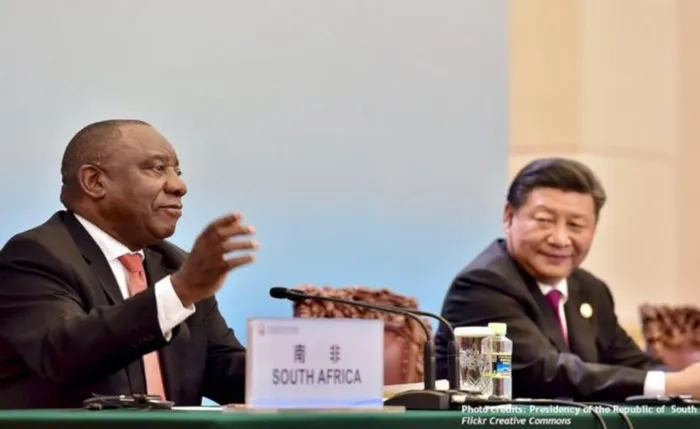Flourishing FOCAC shapes China-Africa relations

President Cyril Ramaphosa, left, and President Xi Jinping at a previous FOCAC. The FOCAC Summit to take place in Beijing, China, is a valuable and refreshing addition to the already formidable body of existing scholarship that reflects on what has become one of the most important global diplomatic events, the writer says. – Picture: Presidency of South Africa / Flickr / Creative Commons
By David Monyae
Last week, the Chinese Embassy in South Africa helped launch Professor Paul Tembe’s timely new book titled: ‘Xi Jinping and the Flourishing Forum on China-Africa Co-operation in the New Era”.
The book, which comes just before the ninth Forum on China-Africa Co-operation (FOCAC) Summit set to take place in Beijing, China, is a valuable and refreshing addition to the already formidable body of existing scholarship that reflects on what has become one of the most important global diplomatic events.
The book offers an incisive analysis on the evolution of FOCAC and how it has shaped China-Africa relations through serving as both a dialogue and co-ordinating platform for Chinese and African leaders.
Professor argues that the first decade of FOCAC was a learning curve with FOCAC receiving both praise and criticism. The second decade of FOCAC, which was shaped by President Xi Jinping’s coming into power in China, saw China intensify infrastructure development in Africa under the Belt and Road Initiative (BRI) even as western countries were relentless in their criticism.
Now in the middle of the third decade, the FOCAC is anchored on President Xi’s Global Development Initiative (GDI), which seeks to erode global poverty and promote common prosperity.
In his keynote speech to mark the launch of the book, the Chinese Ambassador to South Africa Wu Peng noted that the FOCAC “is the most important symbol of China-Africa solidarity and co-operation”. Ambassador Peng also pointed out that since its formation 24 years ago, the FOCAC has become a model for South-South co-operation and a standard bearer for international partnerships with Africa.
Such claims are not just empty talk as they are backed by figures which demonstrate, perhaps beyond any reasonable doubt, the achievements that have been enabled by the Forum. As noted by Ambassador Peng, China-Africa trade grew to a record US$282 billion while Chinese foreign direct investment (FDI) stock in Africa stood at US$40 billion.
No other bilateral relationship between a major country and Africa has yielded nearly as much economic co-operation. For comparison, trade between the United States and Africa stood at US$82 billion in 2021.
As such, this proves that FOCAC is not just a photo opportunity event but a platform where Africa and China have identified and exploited opportunities to build a solid economic and diplomatic relationship for the benefit of the citizens of the respective sides.
In that regard, Mr Peng noted that 52 African countries and the African Union (AU) are now signatories of China’s flagship international economic policy programme: the Belt and Road Initiative (BRI) which was launched in 2013 to facilitate global interconnectivity through the building of infrastructure focusing on the Global South countries.
In Africa, the BRI has yielded tangible results namely the Addis-Ababa – Djibouti and Mombasa-Nairobi railways built and funded by Chinese enterprises and agencies. Moreover, under the BRI, China has built 100,000 kilometres (km) of railways, close to 100,000 km of highways, 60,000 km of submarine cables in addition to 1,000 bridges, 100 ports and more than 100 educational and health facilities.
The achievements of FOCAC, as the ambassador rightly stated, must be attribute in no small way to the mutual values that have for a long time served as the foundation of Sino-African relations. These include equal partnership, mutual benefit, win-win, sincerity, respect for sovereignty and non-interference in internal affairs.
These are the values that have made FOCAC stand out from Africa’s other international partnerships, which are devoid of equality, respect for sovereignty and mutual benefit. Unlike China, most major countries see Africa as a pawn in their self-serving geopolitical schemes hence they tend to disregard African agency.
Some of these countries seek to dictate the Continent’s political and economic choices, as well as the countries which they think the Continent should befriend or shun. However, Africa has rightly denounced such attitudes and approaches as neo-colonial and asserted its independence and sovereignty.
Ambassador Peng also mentioned in his speech that the compatibility of China and Africa’s strategic interests has contributed to the growth of the relationship between the two sides. For example, there have been conscious efforts to link China’s second centennial goal, which is that of building a modern socialist country with Africa’s own Agenda 2063, which aims to build a peaceful and prosperous Continent.
It is the effort to find and pursue common interests that have made the relationship between China and Africa so successful. As the two sides prepare to meet at the ninth FOCAC Summit under the theme “Joining Hands to Advance Modernization and Build a High-Level China-Africa Community with a Shared Future”, there is little doubt that the relationship will be further intensified and strengthened.
At a time where the global order is in a state of flux with some actors thinking in Cold War terms, the relationship between China and Africa can become an anchor of global stability and prosperity.
* David Monyae is the Director of the Centre for Africa-China Studies at the University of Johannesburg
** The views expressed in this article are those of the writer and do not necessarily reflect the views of The African
Related Topics: